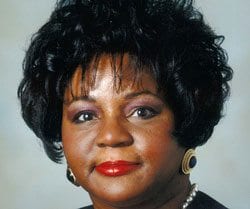
Not many people talk much about affirmative action these days. Shirley Wilcher does. It’s part of her job.
The Mattapan resident is executive director of the American Association for Affirmative Action, a professional organization whose 1,000 members work to assure fair employment practices at private companies, government agencies and colleges. Largely telecommuting from home, Wilcher has directed the Washington, D.C.-based “4-A” since 2005.
In a recent interview, Wilcher offered her professional observations of the state of affirmative action, saying it is faring better in the federal government but faltering in the private sector.
With President Barack Obama in the White House, she said Congress has restored the enforcement capacities of federal civil rights agencies, whose staffs during the Bush administration had cut and forbidden to even use the phrase “affirmative action.”
Under President Bill Clinton, she directed one of those agencies, the Office of Federal Contract Compliance Programs, which enforces a law requiring all federal contractors of size to practice affirmative action, or risk losing their contracts. The mandate covers big defense contractors like Raytheon, universities whose professors conduct federally-sponsored research and even hotel chains such as Marriott where federal employees stay on official trips.
Staffing levels have nearly been restored at the Labor Department agency she led from 1994 to 2000. During that period, the number of its employees reached a high of 815, she said. The Bush administration reduced it to 600, but Obama has increased it to more than 750.
Outside of government, though, Wilcher said affirmative action is in a state of flux and retrenchment, with staffs being reduced or burdened with new responsibilities for vaguely-defined diversity programs. Some positions have been downgraded, so that the affirmative action officer no longer reports directly to a company’s CEO or a college’s president.
“The link between affirmative action and diversity varies, it seems to me, from institution to institution, from business to business,” Wilcher said, based on reports from her organization’s members. “What you’re finding is the chief diversity officer, first of all, will make more money than the affirmative action officer. Sometimes what they’ve done is put the diversity person above the affirmative action professional. But in other cases, there’s a separate office” for diversity programs.
She scorned those as “Kumbaya programs” that, for instance, celebrate Black History Month, but do not redress unfair decisions about hiring, promotion and pay.
“I haven’t seen the model that really underscores the effectiveness of the diversity office,” she said. “I support the concept of diversity as being good for business. I don’t support the de-linking of diversity and affirmative action, because one needs to work with the other. A lot of affirmative action diversity programs, are just — they make you feel good.”
Most of Wilcher’s 30-year career as a lawyer has been devoted to advancing civil rights, not just for African Americans and other racial-ethnic minorities, but also for women, the disabled and veterans.
Born in Akron, Ohio, where both her parents were jazz musicians, she moved at age 12 to Boston to live with her father and stepmother on Fayston Street in Dorchester off Blue Hill Avenue.
Jim Wilcher was a jazz drummer. To support his family, he trained as a tool and die maker, then went to work for Honeywell, a computing pioneer.
“He played music part-time with a little group in town called the Keynotes, a three-man band,” she said of her father, who died in 2006. “He had music in his soul.”
She went to high school at what was then Girls Latin and graduated in 1969, when Ivy League schools except Yale University still excluded women.
“I wanted to go to a Seven Sister, which is the female equivalent to the Ivy League,” she said. “I chose Mount Holyoke because of its beautiful campus, out in western Massachusetts. It was part of the five-college coop, so you can take classes at UMass or Amherst. Also I was a French major, and they had a program where you could spend some time abroad. Ultimately, my first semester senior year I was in Paris.”
Living with a family who belonged to France’s Socialist Party and frequently engaged in political debate, Wilcher set a professional goal of working on public policy in Washington. She completed her preparation at Harvard Law School, where contemporaries included Harvard Law professor Charles Ogletree and John Payton, director-counsel of the NAACP Legal Defense Fund.
Wilcher reached Washington in 1980 as a staff lawyer for the National Women’s Law Center before going to work five years later for the House Education and Labor Committee, chaired then by Rep. Augustus F. Hawkins, a senior Black Caucus member from Los Angeles. Her job entailed defending affirmative action from the Reagan administration’s attacks and monitoring federal civil rights agencies, including the Office of Federal Contract Compliance Programs.
In 1993, Clinton put Wilcher in charge of the agency because of her familiarity with its inner workings. There she had oversight of the quarter of the nation’s civilian workforce.
She returned to Boston in 2006 because her late father was seriously ill. For five months, she worked for the New England office of the Equal Employment Opportunity Commission (EEOC) — until the Bush administration eliminated her job, which she said was supposed to be insulated from politics.
To join EEOC in Boston, Wilcher had left her position as director of the American Association for Affirmative Action. After her ouster, the association hired her back.
“I work from home largely,” Wilcher said. “Wherever I have a computer is where I can get my work done … Then I go down to D.C. about once a month.”






